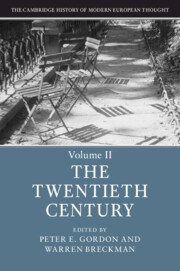Book contents
- The Cambridge History of Modern European Thought
- The Cambridge History of Modern European Thought
- The Cambridge History of Modern European Thought
- Copyright page
- Contents
- Contributors
- Preface
- Introduction
- 1 Sociology and the Heroism of Modern Life
- 2 Psychoanalysis: Freud and Beyond
- 3 Modern Physics: From Crisis to Crisis
- 4 Varieties of Phenomenology
- 5 Existentialism and the Meanings of Transcendence
- 6 Philosophies of Life
- 7 The Many Faces of Analytic Philosophy
- 8 American Ideas in the European Imagination
- 9 Revolution from the Right: Against Equality
- 10 Western Marxism: Revolutions in Theory
- 11 Anti-imperialism and Interregnum
- 12 Late Modern Feminist Subversions: Sex, Subjectivity, and Embodiment
- 13 Modernist Theologies: The Many Paths between God and World
- 14 Modern Economic Thought and the “Good Society”
- 15 Conservatism and Its Discontents
- 16 Modernity and the Specter of Totalitarianism
- 17 Decolonization Terminable and Interminable
- 18 Structuralism and the Return of the Symbolic
- 19 Post-structuralism: From Deconstruction to the Genealogy of Power
- 20 Contesting the Public Sphere: Within and against Critical Theory
- 21 Restructuring Democracy and the Idea of Europe
- Index
2 - Psychoanalysis: Freud and Beyond
Published online by Cambridge University Press: 19 August 2019
- The Cambridge History of Modern European Thought
- The Cambridge History of Modern European Thought
- The Cambridge History of Modern European Thought
- Copyright page
- Contents
- Contributors
- Preface
- Introduction
- 1 Sociology and the Heroism of Modern Life
- 2 Psychoanalysis: Freud and Beyond
- 3 Modern Physics: From Crisis to Crisis
- 4 Varieties of Phenomenology
- 5 Existentialism and the Meanings of Transcendence
- 6 Philosophies of Life
- 7 The Many Faces of Analytic Philosophy
- 8 American Ideas in the European Imagination
- 9 Revolution from the Right: Against Equality
- 10 Western Marxism: Revolutions in Theory
- 11 Anti-imperialism and Interregnum
- 12 Late Modern Feminist Subversions: Sex, Subjectivity, and Embodiment
- 13 Modernist Theologies: The Many Paths between God and World
- 14 Modern Economic Thought and the “Good Society”
- 15 Conservatism and Its Discontents
- 16 Modernity and the Specter of Totalitarianism
- 17 Decolonization Terminable and Interminable
- 18 Structuralism and the Return of the Symbolic
- 19 Post-structuralism: From Deconstruction to the Genealogy of Power
- 20 Contesting the Public Sphere: Within and against Critical Theory
- 21 Restructuring Democracy and the Idea of Europe
- Index
Summary
Perhaps more than any other discipline, psychoanalysis is intimately associated with its founder, Sigmund Freud (1856–1939). That is, of course, no coincidence. From the beginning, Freud bound his new science to his life and psychic world: The Interpretation of Dreams (1899/1900) – to many the Ur-text of psychoanalysis – is informed predominantly by Freud’s self-analysis. Despite the enormous variety of psychoanalytic practice, Freud’s centrality to the field’s self-understanding only increased over the course of the twentieth century, when his legacy was bolstered by a series of hagiographic biographies, the best known of which was published in three volumes by Ernest Jones in the 1950s. Moreover, it has been common to apply psychoanalytic insights to Freud’s life in order to explain the development of his science.
- Type
- Chapter
- Information
- The Cambridge History of Modern European Thought , pp. 44 - 71Publisher: Cambridge University PressPrint publication year: 2019

